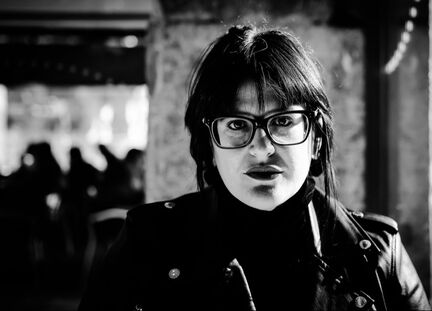 © 2019, Alberto Barrientos
© 2019, Alberto Barrientos
Nuria Núñez Hierro was born in 1980 in Jerez de la Frontera (Spain). She holds a Bachelor's degree in piano and composition from the Conservatorio Superior de Córdoba (Spain) and a Master's degree in composition (finished with distinction) from the University of Arts of Berlin (UdK), where she studied with the composers Elena Mendoza and Iris ter Schiphorst. She has attended seminars with Walter Zimmermann and Arnulf Hermann (instrumentation and orchestration seminars at the Hanns Eisler Musikhochschule) and master classes with composers as Jose M. Sanchez Verdu, Rebecca Saunders, Mathias Spahlinger, Magnus Lindberg, James Dillon and Manuel Hidalgo among others.
Her studies have been sponsored by La Caixa Foundation, the DAAD (German Academic Exchange Service) and the Government of Andalusia.
Her music has been performed in Spain (Auditorio Nacional de Musica in Madrid, Festival de Alicante, Auditorio de Zaragoza,...), Italy (Academy of fne Arts of Spain in Roma), Germany (Deutsche Oper, Konzerthaus Berlin, Volksbühne, Haus der Kulturen der Welt, BKA Theater, Spring Music Festival of Weimar, Donaueschingen Festival-Next Generation, Konzertsaal of the HfM Hanns Eisler, 20 Jahre Berliner Gesellschaft für Neue Musik, Universität der Künste Berlin,...), Russia (Rakhmaninov Hall of the Moscow Tchaikovsky Conservatory), France (Festival IRCAM- ManiFeste), Slovenia (Ljubljana, 14th World Saxophone Congress), Bogota (Auditorio Fabio Lozano), Mexico (Festival Puentes) by orchestras as the National Orchestra of Spain, Rundfunk Sinfonieorchester (RSB) Berlin, RSO Stuttgart, the Jenaer Philarmonie, the Young National Orchestra of Spain (JONDE), the Seville Royal Symphony Orchestra, the Philarmonic Orchestra of Malaga and ensembles as the Ensemble Intercontemporain, Ascolta Ensemble, Studio New Music of Moscow, Modern Art Ensemble Berlin, Trio Transmitter, Ensemble DieOrdnungderDinge, Liminar Ensemble or Taller Sonoro.
She has been awarded numerous prizes and scholarships such as the XXXIX Queen Sofia Composition Prize, the Rome-Prize (German Academy Rome Villa Massimo - Casa Baldi), First Prize and the Audience Prize at the Composition Competition for Orchestra of the Spring Festival of Weimar (2014), the Villa aurora Fellowship (2015, artistic residence in Los Angeles), the fellowhip of the Graduate School for the Arts and Sciences of the University of Arts Berlin (from 2014 to 2016, with the research and artistic project Bestiarium, a study of the interrelations of both musical and theatrical elements in current performative productions for all audiences), the Kompositionsstipendium of the Thüringer Landesmusikakademie Sondershausen (2013, artistic residence and a commission work for orchestra), the Third Prize on the VII Jurgenson International Composer's Competition (Centre for Contemporary Music of Moscow) or the Nomination for the European Composer Award of the Festival Young Euro Classic Berlin (2012, with her work Donde se forjan las quimeras). In 2011 she has received the prize Promotion of commissions for young composers of the Academy of contemporary music of the Young National Orchestra of Spain (JONDE), and was selected as composer in residence during 2011 and 2012. Other awards received are the Composition Prize of the CDMC (Centro de Difusion de la Musica Contemporanea) of the Spanish Ministry of Culture during the Young Composer’s Meeting INJUVE 2009 and the 1st prize from SGAE/Fundacion Autor in the International Composers Competition 2007 among others.
As a composer she is particularly interested in developing projects that bring contemporary music closer to young audiences. She argues that the point is not investing only in the future of music, while helping children face art as early as possible as well as helping them understand what is behind an opera or a concert from their own experience. The point is also investing in creating artworks that can be appreciated the same way by adults, without falling back into dramatic mediocrities or musical trivialities and specially without creating a space exclusively for children, thus isolating them in a childish world and depriving them of the serious and true culture of the adult world. Her ideas have generated projects like Bestiarium (2014-2018), Kleines Stück Himmel (2016, chamber opera for audience from 2 to 4 years old, Deutsche Oper Berlin' commission, nominated to the IKARUS Preis) and two projects more to come in 2018 (with the support of the spanish Academy of Arts in Rome) and 2019 (with the support of the Fundación BBVA).
Ms. Nuñez-Hierro's work revolves around the duality musician/instrument. The actual physical contact with the instrument is as important to her as understanding its acoustic and mechanical properties (how does it work, its peculiarities, its tradition, the roles it plays in different ensembles, and ultimately the essence of its sound). In a similar way, the physical presence of the performer is also a source of sound and visual material. It's not a question of exploring instrumental possibilities by means of preparations or extended techniques, but rather a question of integrating the physical presence of the person behind the sound, embracing its fragility and its fallibility. The tension in a clarinetist's embouchure when performing a very high ppp note, the weight of a bass bow on a tam-tam, the held breath that precedes the frst note of the piece... All this is integrated into the composition process.
In her last works she tries to take these ideas a step further by expanding the limits of musical instrument categorization, introducing objects that bring new expressive possibilities to both the player and the instrument.
Literature, particularly the works of iberoamerican writers as Jorge Luis Borges, Xavier Villaurrutia, Cesar Vallejo and Antonio Ramos Rosa, is also a powerful infuence in the genesis of her music ideas and her sound world.